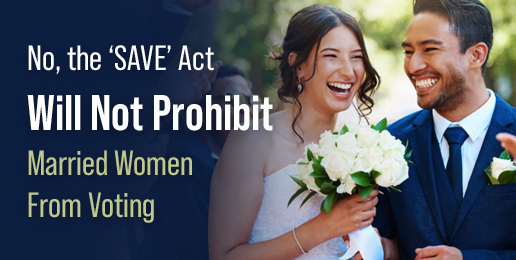Written by Alyssa Sonnenburg
“Married women won’t be allowed to vote!”
This laughable phrase has become one of the most popular arguments when it comes to the pushback that the ‘SAVE’ Act has received from the Left.
Simply put, the ‘SAVE’ Act, or the Safeguard American Voting Eligibility Act, would require proof of American citizenship in the voting process through official documentation such as a birth certificate or a passport.
However, distress calls are being sounded from the Left over this piece of legislation due to their claims that this bill would prohibit a married woman from voting.
According to American Progress,
“Specifically, the legislation would require the vast majority of Americans to rely on a passport or birth certificate to prove their citizenship. While this may sound easy for many Americans, the reality is that more than 140 million American citizens do not possess a passport and as many as 69 million women who have taken their spouse’s name do not have a birth certificate matching their legal name.”
As a married woman, this pushback makes me chuckle, and, if you are also a married woman and are scared that your voting rights will be taken away if the ‘SAVE’ Act is passed, let me put your fears to rest.
First, I just want to mention an important fact. Statistically, married women are more likely to vote Republican as opposed to Democrat.
So, if the “evil” Republicans objective with this legislation was to stop married women from voting, it would be a terrible strategy that would not bode well for the future of the Republican Party.
This fact alone should make you pause when you hear the claim that Republicans are trying to take married women back to the time before the 19th amendment.
Now, for the purpose of putting married women’s minds at ease, I want to explain why this legislation will have no impact on whether or not a married woman will have the ability to vote.
The stated purpose of this legislation in no way points to prohibiting women from voting if they changed their last name after getting married.
This bill, once again, seeks to require proof of citizenship for one to participate in the voting process.
This is why the documentation requirements are birth certificates, passports, or Real ID compliant driver’s licenses, or government-issued ID.
In addition to this, this piece of legislation will be targeting new voter registrations or updates to registrations through address changes or name changes.
Because of this, those who are already registered to vote will in no way be impacted by this legislation unless they are purged from the voter roll through unlawful presence or an address or name change.
This brings me to specifically addressing the name change issue.
If this bill is passed and goes into effect, those who are getting married and planning on changing their last name simply need to make sure that all of their documentation lines up correctly:
- You have your driver’s license in your new last name,
- You have a new passport (if you have one),
- You are registered under your new name, and
- You have your social security under your new name.
May I just say that I had to do all of this anyway when I got married (and this was before the ‘SAVE’ Act).
However, let’s say you change your last name when you get married, but you still have your Real ID driver’s license in your maiden name when you go to vote, there is nothing in the text of the bill that indicates that you will be prohibited from voting.
Meaning, it is highly unlikely that the voting attendees will be checking the databases to see if you changed your last name because this bill has nothing to do with your last name– it has to do with your citizenship status, and if your documentation that you provide (your Real ID driver’s license) clearly states that you are an American citizen, you will be allowed to vote no matter your last name status.
The Left’s claim of “voter suppression for married women” is completely unfounded once you look into the text of the bill and what is actually being proposed.
Once again, your marital status is not the issue– your citizenship status is.
Let’s not forget that it has been well-documented that non-citizens are currently registered to vote and have voted in American elections.
“Every state but North Dakota, New Hampshire, Wisconsin and Wyoming gives applicants for either welfare benefits, driver’s licenses, or in some cases, mail-in ballots federal voter registration forms without demanding proof of citizenship.”
The protection of the integrity of our elections is vital to our nation’s viability, and I, as a married woman, support this bill.

